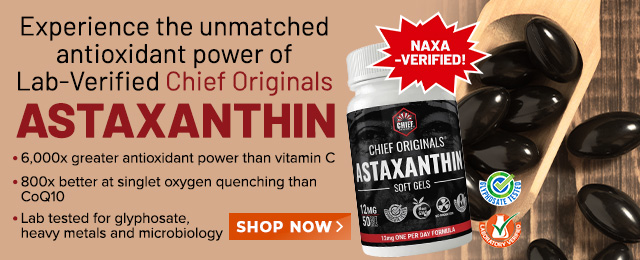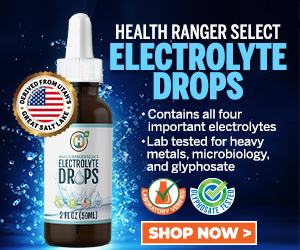
Another screening fraud exposed: PSA tests do more harm than good
Friday, December 31, 2010 by: David Gutierrez, staff writer
Tags: PSA, screening, health news
- Aerosolized bioweapons? Strange “diploid biomasses” falling out of the sky in Florida captured under the microscope
- When antibiotics are unavailable, natural ANTIMICROBIAL compounds become essential first line defenses against infection
- German researchers find link between mRNA vaccines and GENETIC CHANGES that precede CANCER and AUTOIMMUNE DISORDERS
- Exclusive: Microscopic analysis suggests unknown biological contaminants falling from the sky
- DEATH by 12 VACCINES SIMULTANEOUSLY: Doctor playing catch-up on jabs injects 1-year-old baby with massive combination of dirty vax cocktails
- FBI imposed gag order on agents to silence Hunter Biden laptop truth before 2020 election, new chat logs reveal
- Nature's liver guardian: Milk thistle's timeless antidote to modern toxin overload
- “Bankrupt Tesla” movement EXPOSED: Left-wing extremists, Biden-linked operatives target Elon Musk in coordinated attack
- How the Vaccine Industry escaped accountability for nearly FOUR DECADES, endangering children’s lives for false hopes of protection
- “Project Aldrin”: Senate probes Meta's alleged censorship dealings with China
- Newly released JFK files reveal Pentagon's role in creating Lyme disease and covid in the same lab
- European Court of Justice: Healthcare professionals who promoted or administered COVID-19 vaccines are CRIMINALLY LIABLE for any harm caused
- NASA, State Dept. admit to renaming DEI programs to dodge Trump's ban in undercover sting
- The dark legacy of the U.S. government’s UNETHICAL medical and military research
- HAZARDOUS WASTE JABS: Vaccines are classified as “hazardous waste” if dropped on the floor, but as “medicine” when injected into your child
- Sleep shortfalls and silent brain decline: How poor sleep patterns may herald Alzheimer's risk
- “The Message of the Sphinx”: Did a lost civilization build the Giza monuments?
- Astaxanthin: Nature’s ultimate antioxidant powerhouse
- Newly released JFK files reveal Pentagon's role in creating Lyme disease and covid in the same lab
- Oncologist warns of ‘terrifyingly aggressive’ cancers in children, linked to immune suppression from COVID vaccines
- Kiss Your Genetic Privacy Good-Bye! 23andMe Gets Green Light to Sell Your Intimate Genetic Details to Anyone They Want
- European Court of Justice: Healthcare professionals who promoted or administered COVID-19 vaccines are CRIMINALLY LIABLE for any harm caused
- Analysis: The coming economic collapse, a mass uprising and Trump's three secret weapons to halt the growing revolt
- Woman contracts WORLD'S DEADLIEST VIRUS after unknowingly being given the WRONG VACCINE
- Sugar-free deception: Artificial sweeteners hijack hunger signals, fuel obesity epidemic, study warns
- NIH study, buried for decades, reveals that Flu Shots INCREASE elderly deaths, not prevent them
- Britain’s descent into police state censorship: Parents raided for questioning their daughter’s school system online
- AI weather model outperforms traditional forecasts, boosts accuracy by 20%
- Aerosolized bioweapons? Strange “diploid biomasses” falling out of the sky in Florida captured under the microscope
- DARPA: The shadowy innovator behind the world’s most advanced military technologies
- The Health Ranger releases “Vaccine Zombie” song and music video, using AI-animated zombies for the music video
- Utah governor allows ban on LGBT pride flags in public buildings and schools, will take effect without his signature
- COVID-19 scandal linked to CANCER SURGE: Billionaire researcher sounds alarm
- Musk targets “strangely wealthy” lawmakers in DOGE probe, names Pelosi, McConnell, Schumer
- Dr. Suzanne Humphries makes bombshell appearance on Joe Rogan podcast, exposing vaccine industry deception back to POLIOMYELITIS
- Ancient kitchen secrets REVEALED: How garlic, ginger and green onions fight cancer and heart disease
- Newly released JFK files reveal Pentagon's role in creating Lyme disease and covid in the same lab
- California's social media censorship law struck down: A victory for free speech or a threat to online safety?
- EPA advisor admits the agency is funneling billions to climate groups ahead of Trump’s return to White House
- Dr. Mike Yeadon releases 15-minute testimony - WATCH - about genocidal intent of COVID “vaccines”
- The Health Ranger releases “Vaccine Zombie” song and music video, using AI-animated zombies for the music video
- Florida takes a stand: DeSantis proposes permanent ban on mRNA vaccine mandates
- Rep. Nancy Mace introduces bill to ban biological males from female facilities on federal property
- Mike Adams releases country western hit single: Goin’ Back in Time is Comin’ Home
- Sugarcane extract superior to cholesterol-lowering drugs?
- Survival 101: Effective EMF blocking techniques
- “Why we influenced the 2020 elections”: Facebook files reveal the coordinated effort to bury the Hunter Biden laptop story
- Unpacking the Lies That We’ve Been Fed – new song and music video released by Mike Adams, the Health Ranger
- House Intelligence Committee calls for the ARREST and PROSECUTION of Dr. Anthony Fauci
- The pandemic as a tool for INDOCTRINATION: Understanding “The Indoctrinated Brain” by Dr. Michael Nehls
- Mike Adams releases music poetry sensation: A Child of God
- OpenAI whistleblower who dissented against how the company trained ChatGPT found dead
- Attorney and TikTok influencer explains how he was offered hundreds of dollars to make false claims about Trump, Republicans
- CONSERVATIVES SOUND THE ALARM: Big Pharma and the Left trying to force $32 billion money grab from America’s seniors into year-end spending deal
- Red Cross issues warning to stop blood plasma donations from vaccinated people
- Scientists confirm: GENIUS brain function can be spontaneously unleashed in humans without any apparent cause
- EPA advisor admits the agency is funneling billions to climate groups ahead of Trump’s return to White House
- HYSSOP: What research reveals about the health benefits of this ancient holy herb
- Two containers with completed ballots fall out of truck in Florida
- Fully vaccinated about to see “tsunami” of illness and death, warns virologist
- Global leaders unite to clamp down on “misinformation” with UN-backed Cascais Declaration
- BREAKING: 2025 NDAA authorizes mandatory military draft of WOMEN across America… as Pentagon pursues global NUCLEAR war with both Russia and China at the same time
- Michael Yon warns of a ZIONIST TAKEOVER in Trump’s second administration
- Ozempic and Wegovy weight loss drugs are injectable LIZARD VENOM PEPTIDES that may unleash a devastating wave of organ failure… side effects align with symptoms of SNAKE BITES
- BOMBSHELL: DNA testing kits are a SCAM to develop ethnic-specific bioweapons
- Newly released JFK files reveal Pentagon's role in creating Lyme disease and covid in the same lab
- Israeli soldiers accused of even more torture and abuse in the West Bank
- These 13 countries just signed an agreement to engineer a global FAMINE by destroying food supply
- NASA admits that climate change occurs because of changes in Earth’s solar orbit, and NOT because of SUVs and fossil fuels
- The Health Ranger releases “Vaccine Zombie” song and music video, using AI-animated zombies for the music video
- RFK Jr. clears key hurdle: Sen. Susan Collins backs controversial HHS nominee, signaling a new era for health policy
- Sermon 30: How Jesus reveals Caesar’s FAKE CURRENCY and FALSE AUTHORITY
Doctors screen for prostate cancer by measuring levels of the prostate specific antigen (PSA), a marker of prostate inflammation. Because inflammation can be caused by other conditions, however, large numbers of men are regularly referred for unnecessary biopsies only to find that they have no cancer.
The real problem, however, lies with the purpose of screening itself. Cancer screening is designed to detect cancers early, so that treatment can begin with the goal of lengthening life. This strategy works well for aggressive cancers with reliable screening tests, such as cervical cancer.
But not only is the PSA test notoriously unreliable, but the vast majority of prostate cancers grow so slowly that most men who develop the disease will die of other causes before ever exhibiting any symptoms, let alone a risk of death. Because there is no way to distinguish a normal case of prostate cancer from a rare, aggressive one in the early phases, most men who receive a cancer diagnosis undergo aggressive therapies such as radiation, surgery or hormone treatment. Impotence and incontinence are only two of the common side effects of these treatments.
That's why two major studies concluded in 2009 that PSA screening provides no benefit to men, but is regularly harmful, and why nearly all public health agencies no longer recommend the test. The founder of the test himself, Richard Ablin, has publicly called it "a hugely expensive public health disaster ... hardly [more accurate] than a coin toss."
"There is no evidence that screening for prostate cancer results in any public health advantage," write Gerald E. Markle and Frances B. McCrea in their book What If Medicine Disappeared?
The U.S. government actively discourages the test for men over the age of 75, yet one in three still get it yearly. According to Centers for Disease Control and Prevention researchers Michael Wilkes and Jerome Hoffman, of the University of California-Davis and the University of Southern California respectively, this occurs because men are not properly warned about the test's risks.
"People need to understand better that many screening tests are double-edged swords" that should be used selectively, not indiscriminately, said Howard Brody of the University of Texas.
Writing in the San Francisco Gate, Wilkes and Hoffman note that ignoring all recommendations, the medical establishment continues to promote regular PSA testing. They point to a recent UC Davis seminar on "men's health" that focused exclusively on encouraging PSA screening starting at age 40.
Some overtesting may be attributed to the fact that urologists make a large part of their income from PSA tests, Wilkes and Hoffman say. Beyond that, however, U.S. culture at large is one that prefers erring on the side of more medical tests, rather than fewer.
Brody notes that people now view public discussions of overtesting as an attempt to take away "something of great value." Politicians have capitalized on this sentiment with rhetoric about "government getting between you and your doctor."
A sense of how truly pervasive over-screening is comes from a recent study, conducted by researchers from the Memorial Sloan-Kettering Cancer Center and published in the Journal of the American Medical Association, which found that among patients with advanced cancer, significant numbers still underwent screening for other cancers. Two percent still got tested for colon cancer, while 6 percent of women got tested for cervical cancer and 9 percent got mammograms. An astonishing fifteen percent of men received prostate cancer screening. Yet the average patient in the study lived only two years after the initial cancer diagnosis.
The study shows "a culture of screening on autopilot," lead author Camelia Sima said.
Sources for this story include: http://www.sfgate.com/cgibin/article.cgi?f=/... http://www.google.com/hostednews/ap/article/....
PSA at FETCH.news
Get independent news alerts on natural cures, food lab tests, cannabis medicine, science, robotics, drones, privacy and more.
Take Action: Support Natural News by linking to this article from your website
Permalink to this article:
Embed article link: (copy HTML code below):
Reprinting this article:
Non-commercial use OK, cite NaturalNews.com with clickable link.
Follow Natural News on Facebook, Twitter, Google Plus, and Pinterest
Science News & Studies
Medicine News and Information
Food News & Studies
Health News & Studies
Herbs News & Information
Pollution News & Studies
Cancer News & Studies
Climate News & Studies
Survival News & Information
Gear News & Information
News covering technology, stocks, hackers, and more



"Big Tech and mainstream media are constantly trying to silence the independent voices that dare to bring you the truth about toxic food ingredients, dangerous medications and the failed, fraudulent science of the profit-driven medical establishment.
Email is one of the best ways to make sure you stay informed, without the censorship of the tech giants (Google, Apple, Facebook, Twitter, YouTube, etc.). Stay informed and you'll even likely learn information that may help save your own life."
–The Health Ranger, Mike Adams













































